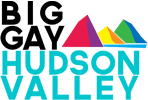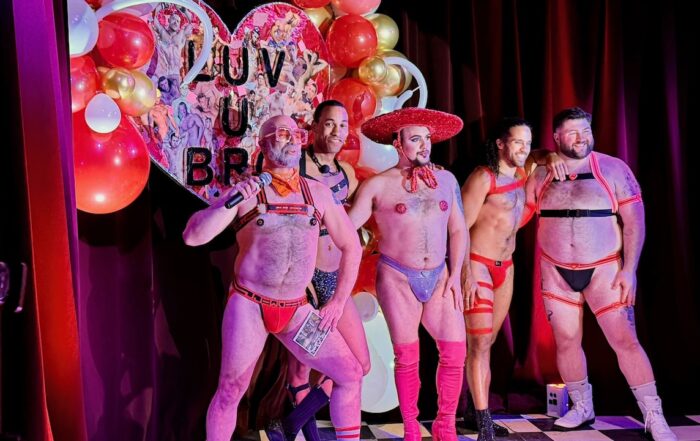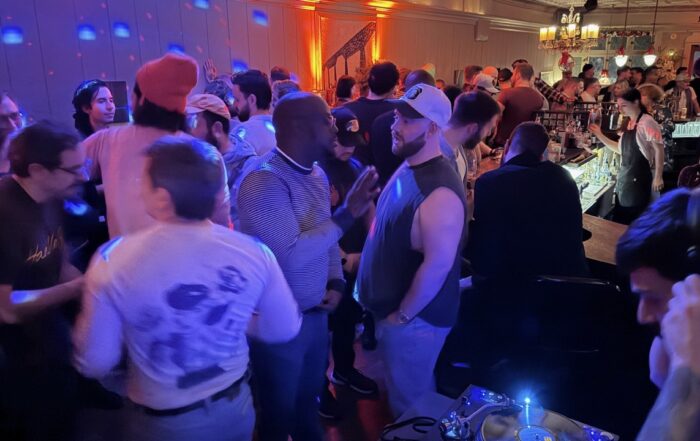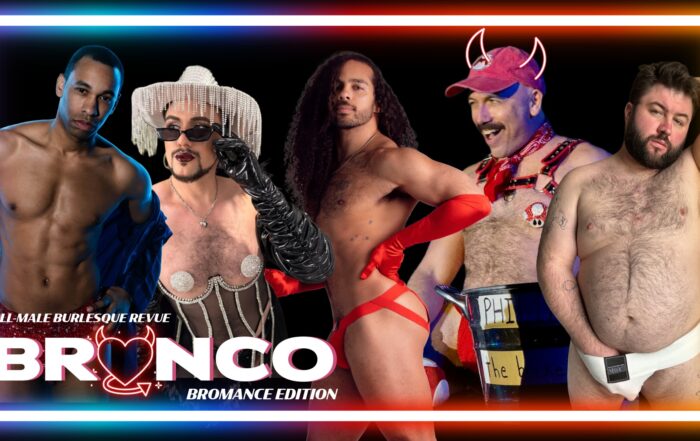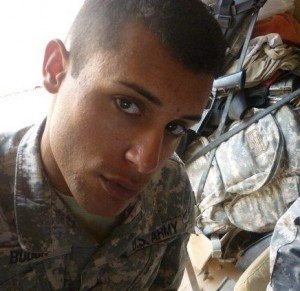 A few months ago, while Marriage Equality was winding its way through the New York State Senate, we learned about another great injustice that was playing out here in the Hudson Valley: Don’t Ask, Don’t Tell. The military policy that was created in the 1990’s to support gay service members, Don’t Ask, Don’t Tell (DADT) has ended up being used for years to criminalize gay service members and force them out of the military.
A few months ago, while Marriage Equality was winding its way through the New York State Senate, we learned about another great injustice that was playing out here in the Hudson Valley: Don’t Ask, Don’t Tell. The military policy that was created in the 1990’s to support gay service members, Don’t Ask, Don’t Tell (DADT) has ended up being used for years to criminalize gay service members and force them out of the military.
Recently we learned that 21-year old Nathanael Bodon of Marlboro had been “outed” by someone in his unit and as a result, he was being discharged from the Army. After close to two months of legal proceedings before his discharge was complete, Nathanael returned to Marlboro last week to spend the Holidays with his family.
Big Gay Hudson Valley was able to sit down with Nathanael and we were able to get a better look at what it was like to be a member of the LGBTQ Community enlisted in the service.
Quiet and well-poised, we invited the former soldier to our home in Highland to sit down and tell us more about his story. When Nathanael first arrived, we could not help but notice the fabulous military-inspired almost knee-high leather boots and eye-liner drawn upon his face.
BGHV: Nathanael, welcome back to the Hudson Valley. We wish that your return could have been under better circumstances, although we’re sure that you are glad to be home for Christmas.
NB: Yes, its great to be back with my family for the Holidays. Christmas is a huge deal for us – but we actually celebrate all through the 12 Days of Christmas. Being Puerto Rican in heritage, the big party for us is on Three Kings Day.
BGHV: Now, before we dig into the details, I need to ask about the boots – and what looks to be eyeliner?
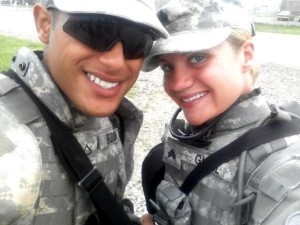 NB: Yes, I actually purchased the boots to help cheer me up while I was still in Iraq. I purchased them online and my family was surprised to find a package addressed to me showing up at their home a few weeks later. I knew I would have to wait to wear them, but it sure made me feel better to do some retail therapy online.
NB: Yes, I actually purchased the boots to help cheer me up while I was still in Iraq. I purchased them online and my family was surprised to find a package addressed to me showing up at their home a few weeks later. I knew I would have to wait to wear them, but it sure made me feel better to do some retail therapy online.
As far as the make-up – yes, I am wearing eyeliner as well. Sometimes I would wear it while on base in Iraq as well. Being stationed at Al Asad Airbase, the military would often have various theme nights on base where service members could go out in an attempt to feel a little more “normal”. Events like Salsa night and hip hop night helped to provide us some semblance of normalcy. When I went to hip hop night, I would go to the beauty salon on base and get a mani-pedi and my eyebrows done. I would then stop by and visit a fabulous girlfriend of mine. She would loan me her eyeliner and we’d have some fun as we got ready to head to the club. I really enjoyed wearing it on occasion and, after all, wearing that military uniform all the time I just felt terrible. It was nice to have an excuse to be more of myself.
BGHV: Really? Going out? Mani-Pedis? Eye liner? We would have had no idea that this was something that an enlisted service member in the Army would have available at his or her disposal.
NB: Well, Islamic culture did not allow any service member to have things like porn on base and since respect for the culture of our visiting nation was a priority, we had to keep ourselves amused in other ways.
BGHV: Now, it sounds like you were pretty “out” – how was this taken by your fellow soldiers?
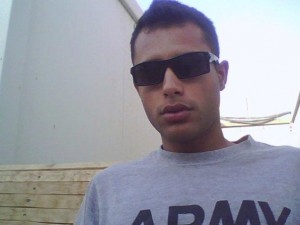 NB: Sure, I will admit that I am effeminate, although I did not talk about things like boyfriends. I was out with close friends, but I did not discuss it with many; they just assumed I was gay. Under Don’t Ask, Don’t Tell, that was OK.
NB: Sure, I will admit that I am effeminate, although I did not talk about things like boyfriends. I was out with close friends, but I did not discuss it with many; they just assumed I was gay. Under Don’t Ask, Don’t Tell, that was OK.
BGHV: Why did you decide to enlist, knowing that gay people were not welcome in the military?
NB: I went into the military knowing I was not welcome there. However, it was really something I wanted to do and I was not going to let the policy of the US military stop me. Sure, at first I minded my P’s & Q’s and left my man purse in the car. For the first few weeks I was in basic training I put on this straight acting front. I talked about having a girlfriend back home – in a voice much deeper than usual – and I even carried a photo of her in my wallet to share with the others… little did they all know, it was just one of my good friends from home.
BGHV: What did your friends think of you joining the military?
NB: To be honest, It really varied from friend to friend. Yes, I lost friends because of joining the military – both straight and gay – as they resented my decision. But my family supported me and that is what mattered most.
As any service member will tell you, being in the military is a love-hate relationship. We deal with a lot of bullshit on a daily basis and frankly, being an enlisted gay man gave me more to contend with, but at the end of the day it could have been a lot worse for me.
The amount of daily bullshit we all had to deal with created a tremendous amount of depression amongst my fellow soldiers – and even the civilian contractors that worked with us. There were times when I would doubt myself. However, I feel like my enlisting made me a much better person and it certainly helped to mature emotionally.
BGHV: Did you find the experience of being enlisted in the military to be similar to the machismo, testosterone-laden image painted by popular culture?
NB: Sure it was both mentally and physically draining – especially during basic training. But I saw plenty of straight friends break down and cry while I was enlisted. Yes, everyone likes to put up a “butch” façade, but at the end of the day we were all just people.
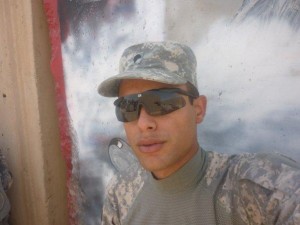 While in the service, I met this guy named Jeff. We hit it off and he gave me a nickname that has stuck with me through my deployment: “Tink”. Yes, short for Tinkerbell. I would harass him while we were in basic training for being a doofy meathead and he would in turn poke fun right back at me. Sure, it may have seemed demeaning to anyone on the outside, although it’s how we built rapport with each other. They soon thought of me as their little sister and not only did they accept me, they also supported me.
While in the service, I met this guy named Jeff. We hit it off and he gave me a nickname that has stuck with me through my deployment: “Tink”. Yes, short for Tinkerbell. I would harass him while we were in basic training for being a doofy meathead and he would in turn poke fun right back at me. Sure, it may have seemed demeaning to anyone on the outside, although it’s how we built rapport with each other. They soon thought of me as their little sister and not only did they accept me, they also supported me.
Jeff, my buddy from basic training, drove a Confederate flag emblazoned ‘75 Ford pickup truck and would go on and on out about he did not really like gay people, although he would then go on to gush about how much he liked me – his “Tink”. Even though he was a redneck, he had my back. That happened a lot. But I only let the guys from my unit call me Tink.
BGHV: Now, you were based in places within Iraq, correct? What was your role?
NB: Yes, I was based in both Baghdad and Al Asad. I started my time in Iraq with the green zone and then was moved outside of the immediate city after a few months.
I was enlisted in the military for two-and-a-half years before I was discharged. When I first arrived in Baghdad I served as a Motor Transport Operator, which basically meant I drove large fuel trucks to wherever they were needed.
Shortly thereafter, I was transferred to Al Asad Airbase, where I served as a TMR manager. TMRs are the large containers – typically 40 feet long and 16 feet tall – that served as our main way of transporting materials both inside and outside of Iraq. While I was at Al Asad, I was promoted to more of a logistical support role and I was responsible for the transportation of recycled materials that were being used to support the drawdown and redistribution of resources as we prepared to exit the country. Essentially, I would make sure that if we had surplus supplies at one base, we were able to get them to where they were needed by the military.
BGHV: Now, what happened with Don’t Ask, Don’t Tell? Who outed you?
NB: Well, under Don’t Ask, Don’t Tell, if you state that you are gay or have the propensity for homosexual acts, the military has every right to kick you out of the armed services. While in Iraq, I was writing a blog about my experiences for friends and family. I included the mailing address for my unit in Iraq on my blog and someone googled the unit. When they did, my blog popped up and it had a photo of me kissing my ex-boyfriend. Someone brought this photo to the commander and because it was on a public form, this was the same as me telling him that I was gay.
I still don’t know who it was – no one fessed up to it. That said, the trust I had established within my unit was totally broken and I really felt betrayed.
BGHV: What happened once they found out you were gay?
NB: It was all a blur, really. I was transported back to Baghdad while my discharge paperwork was processed and honestly, I spoke with no one. All my friends knew what was happening and even thought they were around, I unable to trust anyone. So, I sat tight and kept to myself.
I am not spiteful about the discharge. Sure, it has generated a great deal of emotion for me and I have very mixed emotions about now being home. I love life here in the Hudson Valley, but I feel strongly that I can do my job just as well as any of my macho military counterparts. I just hate the fact that my abilities are not considered because of my personal life.
At the end of day, I was able to negotiate an honorable discharge, which means that I am able to keep my status a combat veteran and use my experience to take advantage of programs like the GI Bill to continue my education.
BGHV: What do you want to do now?
NB: I joined the military to step up my life and the military definitely helped me to do that – and to learn a great deal about myself. I am such a different person today from who I was 3 years ago and I appreciate that a great deal.
Now that I am home, I would like to go back to school to major in Fashion Merchandising with a minor in Journalism.
BGHV: Fashion, eh? Do you aspire to help redesign those dreadful military fatigues?
NB: Nah, however, I do want to work with the military – there is a lot that goes on that is still in the stone age and I would like to help them to develop systems to move them ahead. When it comes to the uniforms, there is no help for those.
BGHV: So what is next for you?
NB: Well, I would like to help advance civil rights for all Americans in the military. In my opinion, bigotry in the military is all pervasive. Women in uniform are very disrespected as are any minority. This needs to change if we are going to have a successful military in the future.
Overall, the repeal of Don’t Ask, Don’t Tell is my goal. Since the policy was created, more than 13,000 gays and lesbians have been discharged from the service.
Now that I am home, I am also working on a book about my experience in the service. The working title is Half Way Out and I am creating it to be a survival guide for other service members dealing with the implications of Don’t Ask, Don’t Tell. The goal being how to show gay and lesbian servicemen and women how they can be in the military and still be true to themselves.
BGHV: Well, Nathanael, we really appreciate you taking the time to sit down with us to tell us more about your experiences. While it is sobering to learn more about the conditions which brought you home, we are glad to see that you have returned home safe and sound.
Interested in learning more about Nathanael? You can keep up with him by following his blog, or listen to a recent story about his experiences that was featured on WAMC, Northeast Public Radio.
Upcoming Events, Sent to You Every Week.
Stay a ‘Mo in the Know about events, news and local happenings, delivered directly to your inbox every Tuesday.
